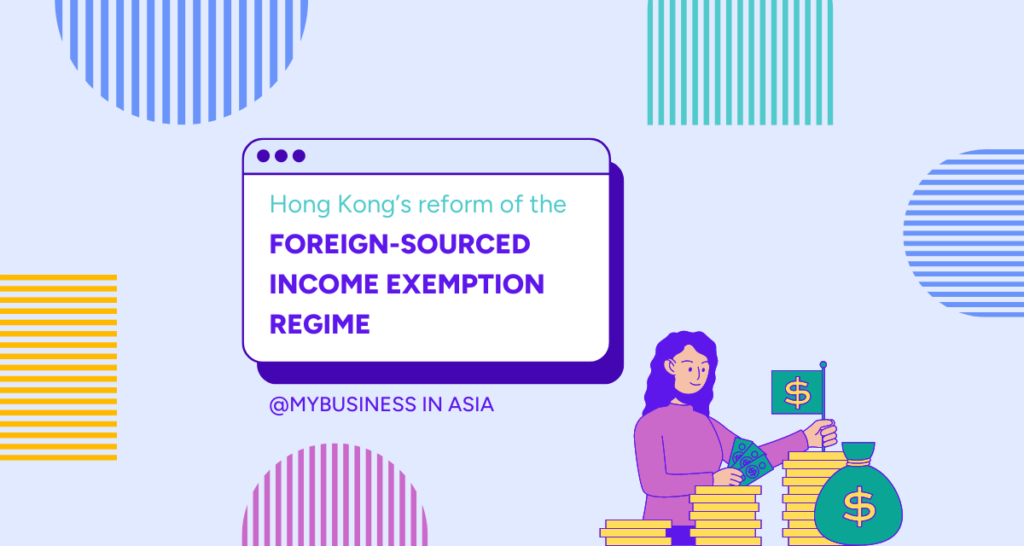
In this article, we will cover:
- Hong Kong’s Tax Practices Under EU Scrutiny: Non-Cooperation Raises Concerns
- Hong Kong will adapt its foreign-sourced income tax exemption regime
Thus far, Hong Kong adopts a territorial basis for taxing profits derived from a trade, profession, or business carried on in Hong Kong. But it has proposed to reform the foreign-sourced income exemption regime.
Companies established in Hong Kong are only taxed on profits made locally, while profits from foreign-sourced are exempted. In other words, profits made in Hong Kong are qualified as onshore and those made outside Hong Kong are qualified as offshore. Profits made in Hong Kong will be subject to tax (corporate income tax: 16,5%), while those made outside will be exempt from tax in Hong Kong.
For most of the companies (exemptions can be found on the website of the Inland Revenue Department of Hong Kong) a dual tiers tax rates apply based on revenues as follows:
| Rates of the tax (based on revenues) | Two-tiered rates | Non two-tiered rates |
| First HKD 2,000,000 | 8.25% | 16.50% |
| After first HKD 2,000,000 | 16.50% | 16.50% |
Hong Kong’s Tax Practices Under EU Scrutiny: Non-Cooperation Raises Concerns
On 5 October 2021, Hong Kong has been added to the European Union’s “Watchlist” on non-cooperative jurisdictions for tax purposes1. Indeed, European Union considers that Hong Kong’s territorial tax system may facilitate tax avoidance and sees also possible risk of double non-taxation arising from the tax exemption for offshore passive income in the absence of any requirement for recipient companies to have a substantial economic presence in Hong Kong.
The EU was mainly concerned about possible exploitation of the tax arrangement by shell companies for tax benefits.
The European Union has granted until 31 December 2022 for Hong Kong to make the necessary changes.

Hong Kong will adapt its foreign-sourced income tax exemption regime
In response to the European Union, the Hong Kong Government has proposed to change the Inland Revenue Ordinance (Cap. 112) to refine Hong Kong’s Foreign-Sourced Income Exemption (“FSIE”) regime for passive income by proposing the following changes:
- Offshore dividends, equity disposal gains, and interest will continue to be exempt from profit tax in Hong Kong under the FSIE regime only if the entity concerned satisfies the economic substance; and
- Offshore intellectual properties income such as royalties, will also continue to be exempt from profit tax if the entity concerned satisfies the OCDE’s nexus approach requirement2; and
- Please note that pure equity holding companies will consequently be subject to a reduced economic substance requirement.
To satisfy the economic substance the Hong Kong company will need to meet certain criteria such as:
- Employing a sufficient number of qualifying employees;
- Making necessary strategic decision, and managing the Hong Kong company from Hong Kong; and
- Conducting relevant activities in Hong Kong depending on the type of income declared when offshore dividends, equity disposal gains, and interest are concerned.
The Hong Kong government, in refining the FSIE regime, will keep following the below-principles to keep protecting Hong Kong’s interests and remain an international center for companies:
- To continue to adhere to the territorial source principle of taxation;
- To uphold the Hong Kong’s simple, certain and low-tax regime with a view to maintaining the competitiveness of Hong Kong’s business environment; and
- To minimize the compliance burden of corporates.
Footnotes
1 The European Union’s list of non-cooperative jurisdictions wants to encourage positive change in the tax legislation of countries and practices, through cooperation.
2 The nexus approach states that the concerned entity must have substantial economic activities undertaken in Hong Kong and that those economic activities should tie the tax benefits directly to R&D expenditure.


